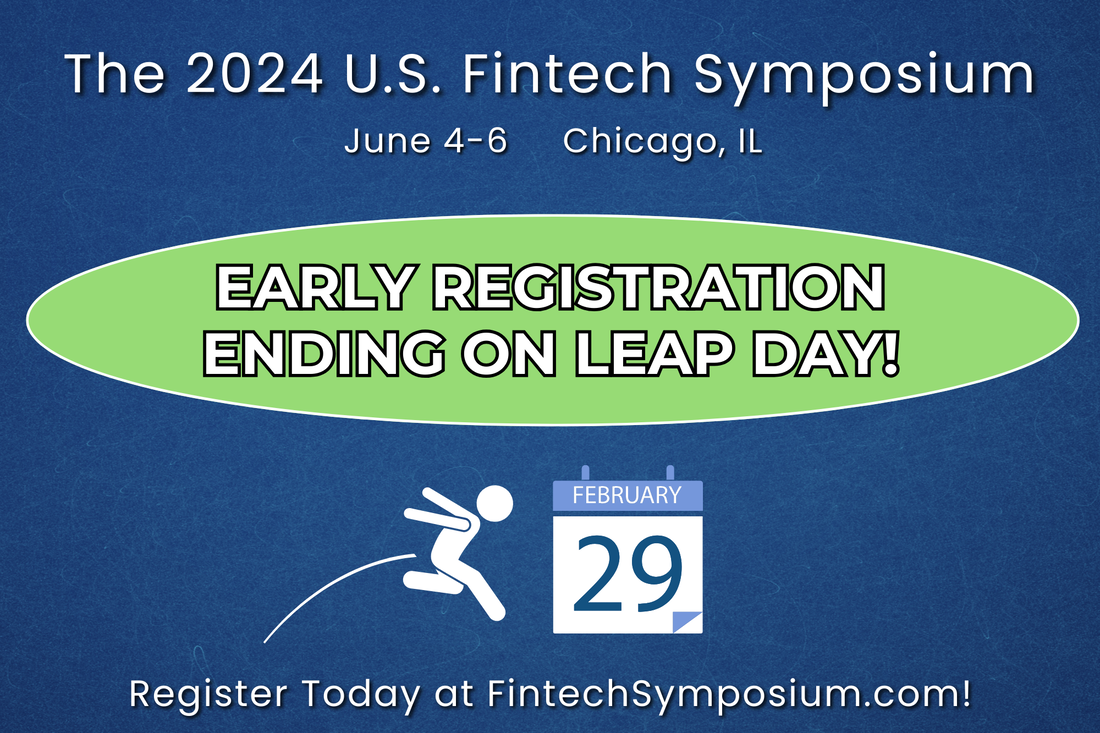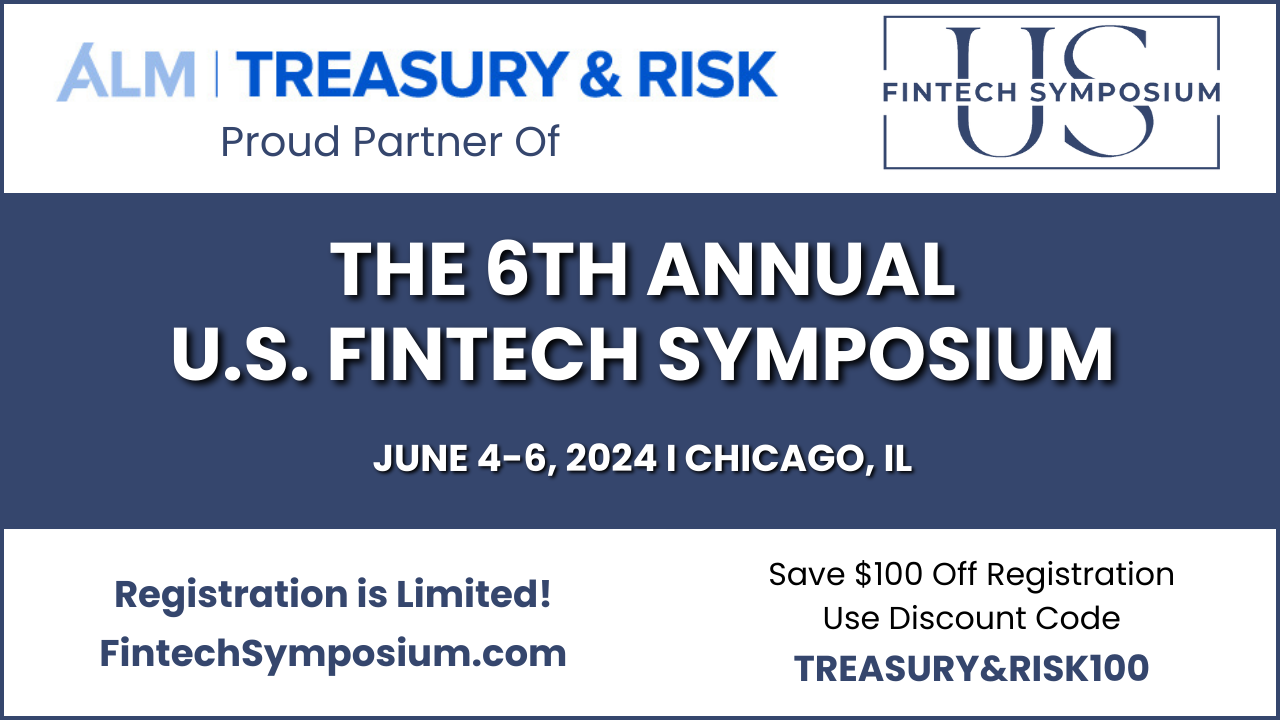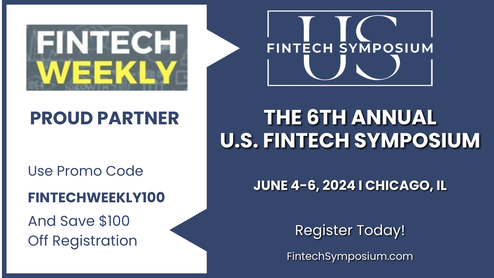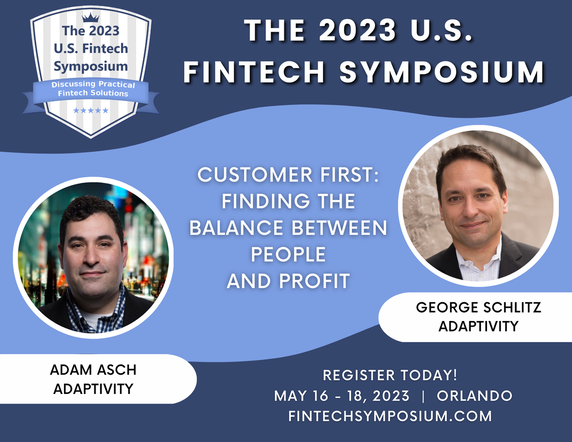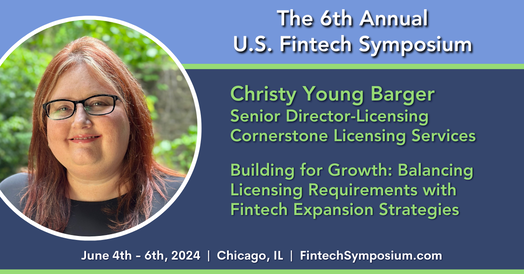 Exciting announcement! We are thrilled to present an engaging new member to our roster of speakers! Christy Young Barger, the Senior Director-Licensing at Cornerstone Licensing Services, will serve as the moderator for the Peer-to-Peer Discussion titled "Building for Growth: Balancing Licensing Requirements with Fintech Expansion Strategies" at the 6th Annual U.S. Fintech Symposium, June 4-6, 2024 in Chicago. During the last 18 years with Cornerstone, Christy has formed and maintained valuable client relationships. In her current role she speaks with industry leaders to navigate clients through new licensing based on company activity, statutory compliance notifications regarding corporate changes, overall client expansion and development, and more. Her passion to see her clients succeed calls for her to continuously study the latest state licensing requirements and regulations to ensure proper licensing.
0 Comments
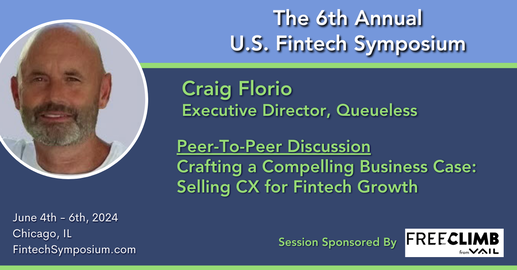 Exciting news! We are excited to introduce a dynamic addition to our lineup of speakers! Craig Florio, Executive Director at Queueless will be a moderator for the Peer-to-Peer Discussion "Crafting a Compelling Business Case: Selling CX for Fintech Growth" at the 6th Annual U.S. Fintech Symposium. A veteran of Financial Services and an innovative business executive, Craig brings 25 years of experience in business operations, contact center, and technology to the table. With extensive experience as a CX leader, Craig’s focus has been on intelligent, data driven automated Digital, and Voice solutions. He is a customer and agent first advocate who believes that a frictionless experience has a direct benefit to the business bottom-line. 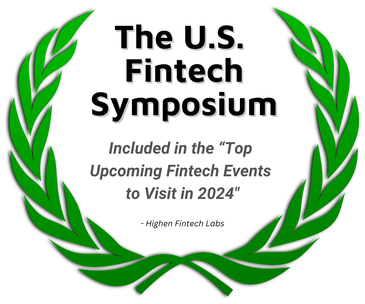 We're thrilled to announce that the U.S. Fintech Symposium has been recognized as one of the "Top Upcoming Fintech Events to Visit in 2024" by Highen Fintech Labs. This acknowledgment speaks volumes about the quality and relevance of the U.S. Fintech Symposium in the ever-evolving financial technology industry. Highen Fintech Labs states, "The U.S. Fintech Symposium is a valuable resource for financial professionals seeking fintech insights. Through panels, keynotes, and networking, it offers practical fintech applications in the financial services industry." Don't miss out on this opportunity to gain valuable insights and forge meaningful connections within the fintech community. Register now to secure your spot at the U.S. Fintech Symposium and take your understanding of financial technology to new heights.  Do you work for a startup with innovative products and/or services that affect the fintech industry? Are you looking for a platform to showcase your product to industry leaders and potential investors? Look no further! We're thrilled to announce the launch of the Fintech Startup Showcase program at the 2024 U.S. Fintech Symposium! At the Fintech Startup Showcase, we're committed to providing a spotlight for startups formed after January 1, 2019, with revenues under $10,000,000 and fewer than 10 employees. Whether you're disrupting the payments industry, revolutionizing lending practices, or pioneering new technologies in financial services, this is your chance to shine. What sets our showcase apart is its accessibility and affordability. For a modest investment, startups can secure a spot in the Fintech Startup Showcase and gain unparalleled exposure to our audience of industry leaders, investors, and potential partners. It's a golden opportunity to elevate your startup's visibility and propel your growth journey forward. Participating in the Fintech Startup Showcase not only offers startups with a platform to showcase innovation but also provides invaluable networking opportunities and access to expert insights. Startups will have the chance to connect with fellow entrepreneurs, learn from industry veterans, and forge strategic partnerships that can drive your startup's success. Don't miss out on this opportunity to take your fintech startup to the next level. CLICK HERE TO SIGN UP TODAY! New Peer-to-Peer Moderator Announcement: Sarah Grooms from Wintrust Financial Corporation!2/20/2024 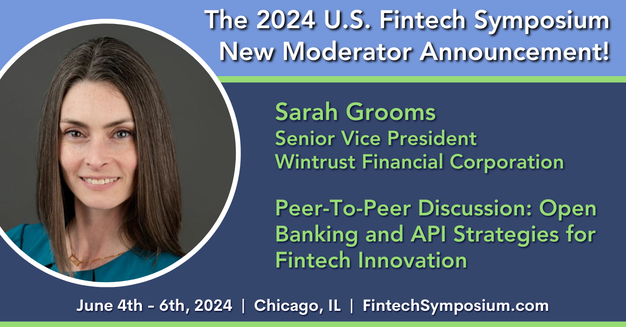 We are thrilled to announce the addition of a dynamic new speaker! Sarah Grooms, Senior Vice President at Wintrust Financial Corporation will be a moderator for the Peer-to-Peer Discussion "Open Banking and API Strategies for Fintech Innovation". Sarah E. Grooms, CTP is a Senior Vice President and has been with Wintrust Financial and subsidiary companies for over 23 years. Sarah currently serves as the leader of Special Initiatives for the Enterprise, having previously served as Program Director of Digital Transformation. Prior to that, she held roles in Treasury Management sales and leadership, Commercial Lending and Commercial Credit. 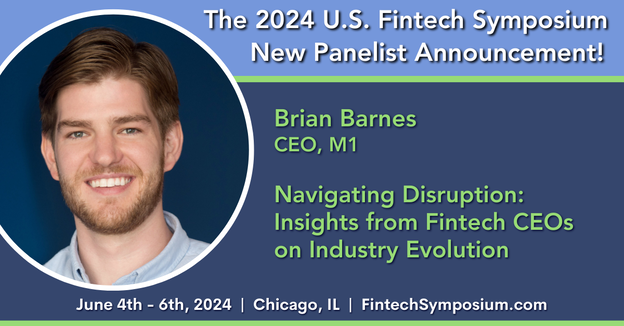 Exciting news! We're delighted to reveal that Brian Barnes, Founder and CEO at M1 Finance will be sharing his insights and expertise at the Keynote Panel Discussion "Navigating Disruption: Insights from Fintech CEOs on Industry Evolution". Brian Barnes is the founder and CEO of M1, a personal finance platform that lets you earn, invest, spend, and borrow. With more than $8 billion in assets under management, M1 helps hundreds of thousands of people build their wealth using powerful automation tools and topflight rates. The company is based in Chicago and has raised $325M at a unicorn valuation.  TreaSolution is happy to announce that FreeClimb from Vail will be a Gold Sponsor of the of the U. S. Fintech Symposium on June 4-6, 2024 in Chicago, Illinois! FreeClimb from Vail helps companies of all sizes realize exceptional customer experiences via the industry’s most intelligent, scalable communications platform built on 32 years of continuous innovation and engineering expertise. They engineer secure software solutions for the financial services industry, offer unparalleled business support, and currently handle 10% of the contact center traffic in the US across contact-intensive verticals such as financial services, retail, hospitality, wireless, and healthcare. Visit https://www.freeclimb.com/ to learn more. Our Appreciation to ALM Credit Union Times for Another Successful Year of Our Marketing Partnership!12/20/2023 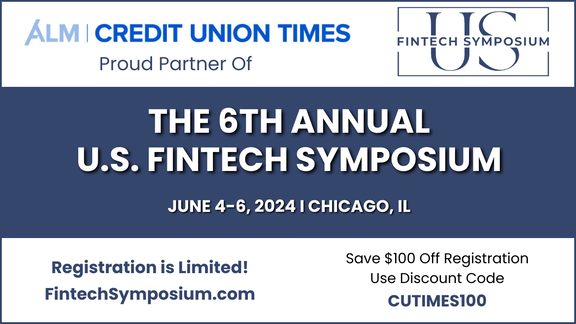 We are thrilled to commemorate two years of a thriving marketing partnership with ALM Credit Union Times. Their commitment and innovative contributions have played a crucial role in our growth and success. The collaboration between our teams has been a driving force behind the achievements and milestones we've reached together. We express our sincere gratitude to ALM Credit Union Times for their professionalism and excellence. We look forward to continuing this successful journey together, leveraging their expertise and dedication for even greater accomplishments in the future. Here's to two years of shared success and to many more to come!
 TreaSolution is happy to announce that Cornerstone Licensing will be a Gold Sponsor of the of the U. S. Fintech Symposium on June 4-6, 2024 in Chicago, Illinois! Cornerstone frees you from the burden of licensing so that you can focus on growing your business. You're too busy to spend time and energy on complex, ever-changing licensing requirements that don’t add to your bottom line. You need a solution that eases that strain. For over 25 years, Cornerstone has given our clients a trusted, cost-effective, and consistent way to ensure their licensing is done right, on time, every time. Visit cornerstonelicensing.com or linkedin.com/company/cornerstonelicensing to learn more. 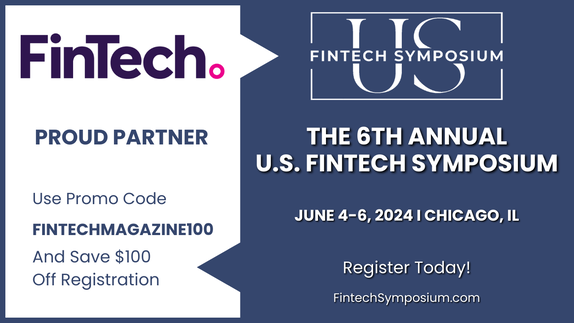 We are excited about the continued alliance with Fintech Magazine, amplifying our presence and impact in the Fintech and Risk & Compliance sectors. Teaming up with Fintech Magazine is an honor, and we are optimistic that our collaboration will elevate the excitement and opportunities for attendees at the U.S. Fintech Symposium. We extend our gratitude to Fintech Magazine for their invaluable partnership, and we look forward the exciting possibilities that the future holds for our collaboration. Thank you Fintech Magazine!
Thank you, Fintech Weekly!
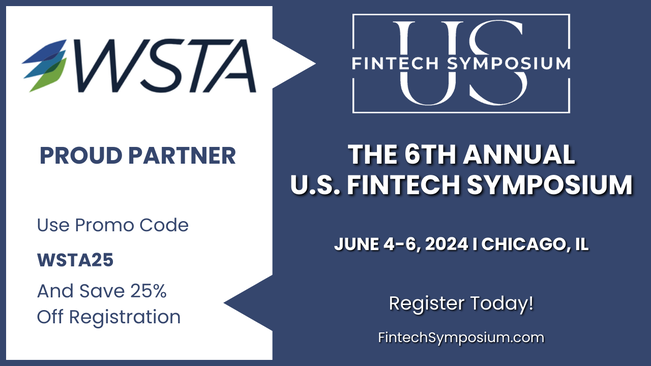 We are thrilled with our ongoing partnership with Wall Street Technology Association (WSTA®) which has enhanced our reach and impact within the Fintech and Risk & Compliance industries. We are proud to partner with WSTA and are confident that this collaboration will bring even more excitement and opportunity to the U.S. Fintech Symposium attendees. Here's to many more years of making the Fintech and Risk & Compliance industries even more captivating. Thank you, WSTA! Thank you to Fintech Futures for their valued marketing partnership of the U.S. Fintech Symposium!10/23/2023  We are thrilled with our ongoing partnership with Fintech Futures which has enhanced our reach and impact within the Fintech and Risk & Compliance industries. We are proud to partner with Fintech Futures and are confident that this collaboration will bring even more excitement and opportunity to the U.S. Fintech Symposium attendees. Here's to many more years of making the Fintech and Risk & Compliance industries even more captivating. Keep an eye out for further updates on this exciting partnership! Thank you, Fintech Futures!  We are thrilled with our ongoing partnership with Fintech Finance News which has enhanced our reach and impact within the Fintech and Risk & Compliance industries. At Fintech Finance, their mission is clear: to produce the slickest episodes and engaging interviews that span the entire financial services spectrum, from traditional branches to the exciting world of blockchain. We are proud to partner with Fintech Finance News and are confident that this collaboration will bring even more excitement and opportunity to the U.S. Fintech Symposium attendees. Here's to many more years of making the Fintech and Risk & Compliance industries even more captivating. Keep an eye out for further updates on this exciting partnership! Thank you, Fintech Finance News! 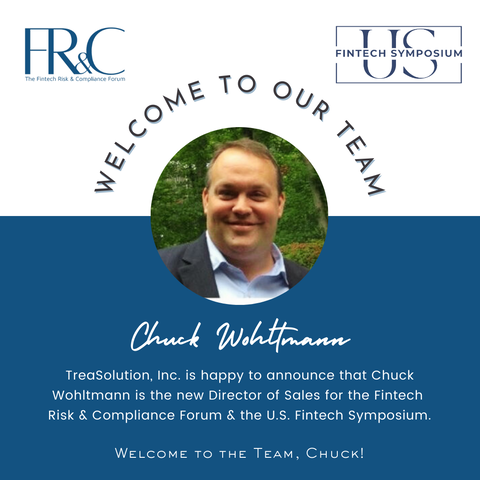 We are happy to announce that Chuck Wohltmann has joined our team as the new Director of Sales! Chuck will be taking the reins on sponsorship sales for both the upcoming U.S. Fintech Symposium and the Fintech Risk & Compliance Forum. As our Director of Sales, Chuck brings a wealth of consultative and sponsorship sales experience to the fintech, finance and tech arena. He's all about building lasting partnerships by truly understanding his clients' needs, helping them reach their business goals and striving to deliver a solid ROI. Chuck's approach isn't just about making deals; it's about creating valuable, enduring connections in the ever-changing fintech landscape. Chuck guides clients towards success by tailoring solutions that align seamlessly with their sales and marketing objectives. His commitment to excellence and knack for turning client needs into tangible results make him an invaluable asset for driving fintech innovation and growth." With Chuck's expertise, we're geared up to create industry leading (and changing) #fintech conferences. 🚀 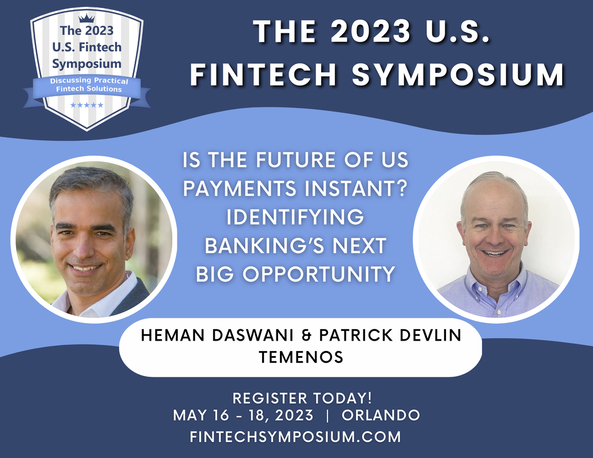 The payments landscape is undergoing a convergence, where the adoption of instant payments is becoming a question of when rather than if. The arrival of FedNow is set to drive innovation across a range of new payment use cases while reimagining older ones. Forward-thinking banks are reevaluating their technology strategies to keep pace with these changing dynamics. By consolidating multiple payment engines, transforming processes, and prioritizing customer experiences, they are taking steps towards transformation. However, the main challenge they face is the hurdle of outdated legacy systems. Join Temenos experts as they explore the changing landscape of faster payments, highlighting the technology that is driving improvements in speed and customer experience for both domestic transactions and cross-border remittances. Learn about the impact of key initiatives like FedNow and Real-Time Payments (RTP), and discover how your bank can capitalize on new opportunities. 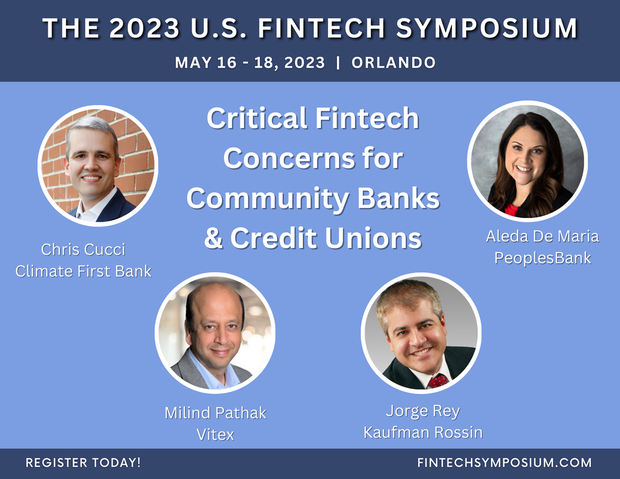 We are happy to announce that Aleda De Maria, Executive Vice President at PeoplesBank, will be joining us as a panelist for the Critical Fintech Concerns for Community Banks & Credit Unions Panel Discussion! The U.S. Fintech Symposium will feature a timely and important panel discussion that will focus on the challenges and concerns that community banks and credit unions face in the fintech space. The panel will bring together experts from the banking and fintech industries who will provide their insights and experiences on the most pressing issues impacting community banks and credit unions. Attendees will have the opportunity to hear from industry leaders on how to navigate the ever-changing fintech landscape, including topics such as data security, compliance and customer experience. The panel discussion on "Critical Fintech Concerns for Community Banks & Credit Unions" promises to be an invaluable resource for financial institutions of all sizes. As community banks and credit unions look to stay competitive and meet the evolving needs of their customers, they face a variety of challenges. The panelists will provide their unique perspectives on how to manage these challenges and opportunities, and will discuss strategies for building successful fintech partnerships that can help these institutions thrive in the digital age. Overall, the panel discussion is a must-attend event for anyone interested in the intersection of fintech and community banking. Attendees will gain valuable insights and practical advice from industry experts who have firsthand experience in dealing with the most pressing issues facing community banks and credit unions. This panel discussion is a must-attend event for bankers, fintech executives or other executives that have a general interest in the future of financial services. 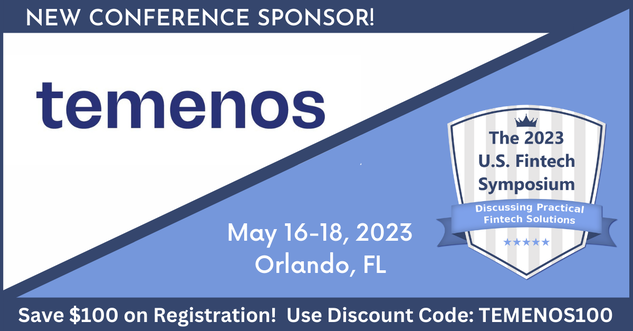 TreaSolution is happy to announce that Temenos will be a Platinum Sponsor of the 2023 U.S. Fintech Symposium on May 16th - 18th in Orlando, Florida! Temenos (SIX: TEMN) is the world’s leading open platform for composable banking, creating opportunities for over 1.2 billion people around the world every day. We serve 3000 banks from the largest to challengers and community banks in 150+ countries by helping them build new banking services and state-of-the-art customer experiences. The Temenos open platform helps our top-performing clients achieve return on equity three times the industry average and cost-to-income ratios half the industry average. 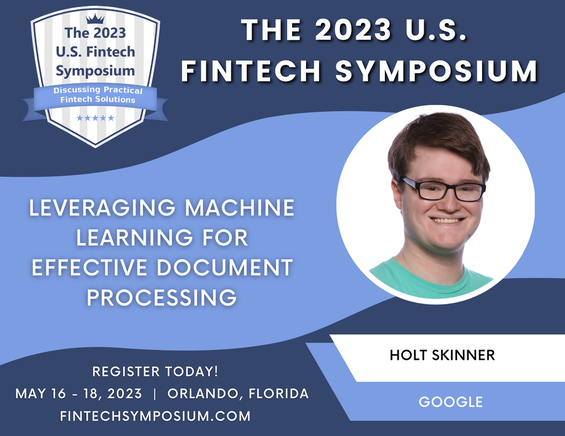 Companies around the world rely heavily on documents to store and convey information. This information often needs to be digitized for it to become useful; however, this is usually accomplished through time-intensive, manual processes. This is especially prevalent in the financial sector where many businesses need a paper trail. Using advancements in machine learning and cloud technology, it's possible to automate many of these processes to make them more efficient and scalable. Document Understanding is the study and implementation of AI/ML towards document processing, including Optical Character Recognition, Entity Extraction, Natural Language, Large Language Models, Classification, and Generative AI. In addition, we will discuss Document AI, a platform from Google Cloud that takes unstructured data from documents and transforms it into structured data, making it easier to understand, analyze, and consume.
 TreaSolution is happy to announce that Adaptivity will be a Take-a-Break Sponsor of the 2023 U.S. Fintech Symposium on May 16th - 18th in Orlando, Florida! Adaptivity will be sponsoring a Take-a-Break networking session and speaking at the conference. Also, Adaptivity will be available for 1-on-1 meetings so attendees can learn more about how they help clients continuously adapt and simplify their digital transformation. About Adaptivity Adaptivity is a consulting firm with a deep understanding of how technology enables successful business outcomes. Our team of expert advisors, subject matter experts, coaches and trainers helps organizations increase their impact by developing the capability to continuously adapt in our fast-paced digital world. Our mission is to empower people to design their organizations for greater adaptability and lead them to higher levels of execution.
Change is difficult for many complex organizations, and the vast array of methods, processes, and paradigms available only makes things more complicated. Adaptivity attempts to simplify by tailoring the approaches and experience needed to help our clients to achieve the outcomes they desire – leaving every team and leader far more capable than when they began. 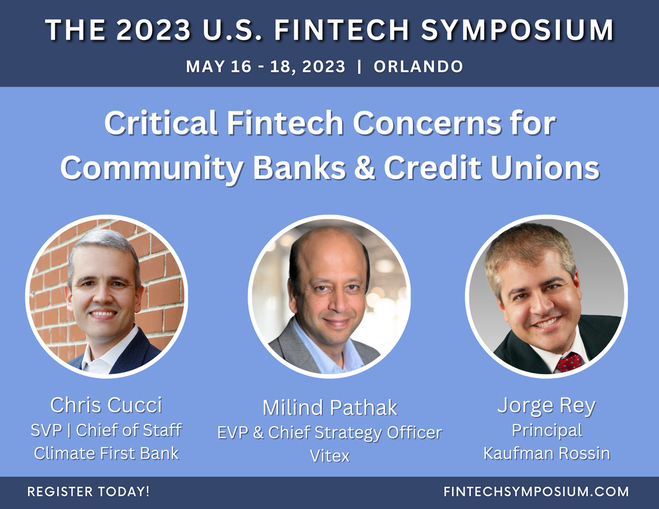 The U.S. Fintech Symposium will feature a timely and important panel discussion that will focus on the challenges and concerns that community banks and credit unions face in the fintech space. The panel will bring together experts from the banking and fintech industries who will provide their insights and experiences on the most pressing issues impacting community banks and credit unions. Attendees will have the opportunity to hear from industry leaders on how to navigate the ever-changing fintech landscape, including topics such as data security, compliance and customer experience. The panel discussion on "Critical Fintech Concerns for Community Banks & Credit Unions" promises to be an invaluable resource for financial institutions of all sizes. As community banks and credit unions look to stay competitive and meet the evolving needs of their customers, they face a variety of challenges. The panelists will provide their unique perspectives on how to manage these challenges and opportunities, and will discuss strategies for building successful fintech partnerships that can help these institutions thrive in the digital age. Overall, the panel discussion is a must-attend event for anyone interested in the intersection of fintech and community banking. Attendees will gain valuable insights and practical advice from industry experts who have firsthand experience in dealing with the most pressing issues facing community banks and credit unions. This panel discussion is a must-attend event for bankers, fintech executives or other executives that have a general interest in the future of financial services. 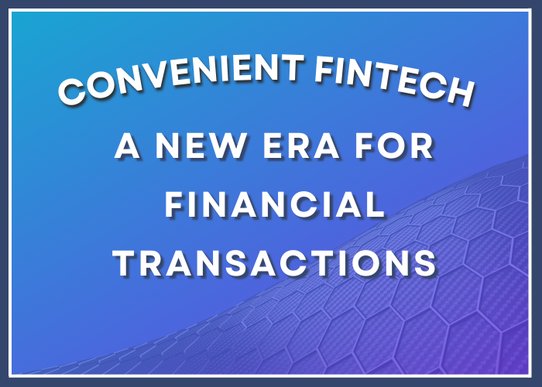 Fintech has led to increased accessibility, affordability, and convenience in financial services. From digital banking to investing and lending, fintech has transformed the way individuals conduct financial transactions, eliminating the need to physically visit traditional financial institutions. Additionally, payment solutions such as mobile wallets and peer-to-peer payment apps have gained popularity due to their secure and cost-effective nature. An exciting development in fintech is the integration of financial services into non-financial products and services, known as embedded finance. For instance, e-commerce sites can offer financing options at checkout, simplifying the process of acquiring credit. As a result, embedded finance has expanded access to financial services beyond traditional financial institutions. Fintech companies continuously disrupt traditional financial institutions by introducing innovative business models and technologies. This has caused a fundamental shift in the industry and is expected to further transform finance as technology advances. Consequently, there will be an increase in the number of new products and services, as well as new opportunities to integrate financial services into various sectors. Through the reduction of barriers to financial transactions and the introduction of innovative solutions, fintech has presented a challenge to traditional financial institutions, prompting them to adapt and incorporate new technologies. It is expected that there will be further advancements as fintech continues to shape the future of finance. |
